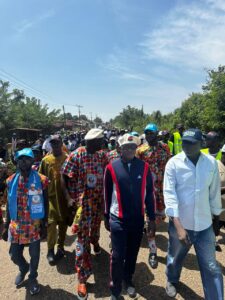Obasanjo to NPC: conduct accurate, credible Census next year
Former President Olusegun Obasanjo yesterday urged the National Population Commission (NPC) to create accurate, credible and acceptable data with the forthcoming 2023 Census.
He said such document would assist the country in planning and formulating policies.
Obasanjo made the call during a courtesy visit by the NPC Executive Chairman Nasir Kwarra, who came alongside with the United Nations Population Fund (UNFPA) Country Representative in Nigeria and other officials of the commission at the Olusegun Obasanjo Presidential Library (OOPL) in Abeokuta.
According to him, if a credible and accurate census is achieved by the NPC, it will help the nation in planning better and formulate policies that will aid the development of the country.
He, however, recalled the last census conducted in 2006 during his administration, to be first in history to be conducted without conflicts, acrimony and contention.
He stressed that Nigeria had failed to make adequate use of the results of census previously conducted in country.
Obasanjo said: “We are running away from making use of our census, the same way we are running from religion and ethnicity.
“The census should lead to real demarcation of constituencies which we have run away from since 2006
“Census figures that we do not use for planning, for real demarcation and all that is not serving a useful purpose; it is a waste of money; I believe we should get this right, so that we will be able to know where we are today.
“I don’t know how long we will keep running away from census, and we keep deceiving and lying to ourselves, by running away from the truth we must face and deal with it.”
Kwarra in his remark commended Obasanjo for conducting a successful census and for giving the commission the solid platform to continue.
He said the aim of the Commission’s visit to Ogun was to monitor the conduct of the trial census in Imeko-Afon Local Government Area as one of the six areas selected for full enumeration across the country.
According to him, 7,718 enumeration areas had been selected for the trial census to test run the suitability and readiness for the actual census in 2023, noting that six local government areas would be fully enumerated during the trial.
“The six local government areas that will be fully enumerated are Toungo Local Government Area, Adamawa State (Northeast); Daura Local Government Area, Katsina State (Northwest); Karu Local Government Area, Nasarawa State (Northcentral).
Others are: “Imeko-Afon Local Government Area, “Ogun State (Southwest); Idemili South Local Government Area, Anambra State (Southeast) and Brass Local Government Area, Bayelsa State (Southsouth).”RMERS have alerted Nigerians to imminent rise in food prices.
The prices of staple menu like beans, rice and garri may jump by as high as 50 per cent from next month, they warned.
According to the All Farmers Association of Nigeria (AFAN), farmers have been sacked from their farmland by the heightened insecurity across the country.
AFAN’s local chapter chairman in Lagos State, Otunba Femi Oke, said a 100 kg bag of beans could sell for more than N100, 000 as from August.
The bag of brown beans, which sold for N47, 000 in June last year, was already selling for N82, 000.
In July 2020, a 50kg of beans sold for N12, 750. But the price went up to N30, 000 by January last year and rose to N45, 000 six months after.
Also, a four-litre paint bucket of beans now sells for between ¦ 2, 500 to ¦ 3, 000.
Similarly, the prices of corn, rice and soybean have risen, following insecurity which has contributed to declining supply and high production costs.
The price of a 50kg bag of rice, which sold for between N21, 125 and N28, 500 in July 2020, also rose last year.
A 50kg sack of garri, which was offered for N11, 500 in July 2020, had gone up to N14, 500 a year later.
There was a jump from a 50kg of maize from N17, 250 in July 2020 to N17, 500 in January 2021. The price has hit N24, 000.
A basket of tomatoes which sold for N8, 500 in July 2020 rose within two years to N25, 000. The price of a tonne of cassava rose from N18, 000 in March 2020 to between N100, 000 to N130, 000.
The rise in prices of corn, rice and soybeans, have affected the prices of eggs prices, following increase in the price of poultry feeds.
A crate of eggs has gone to between N1, 700 and N2, 500, depending on location and sizes.
The National Bureau of Statistics (NBS) confirmed in its report that the price of selected food items have continued to increase.
Its report showed that the average price of one kg of beans rose on a year-on-year basis by 44.32 per cent from N359.64 in April 2021 to N519.05 in April 2022.
Also, on a month-on-month basis, the price increased by 2.59 per cent to N505.94 in March this year.
The rising food prices triggered inflation, with vegetables, oil and meat seeing particularly large increases, according to various figures.
Food constitutes the biggest component of goods used to measure prices, according to NBS projections.
Oke attributed the trend to growing insecurity that has driven farmers from the farms.
He urged the government to confront the impact of the current security crisis on strategic food commodities.
Aside from insurgency, he noted that banditry across farmlands has taken a toll on the sector, driving farmers away from cultivating crops and putting a strain on food production.
The AFAN chief warned that insecurity would take the prices of food out of the reach of Nigerians.
He noted that banditry; kidnappings for ransom and threats of gunmen attacks have forced many farmers to flee Adamawa, Borno and Yobe states.
According to him, a guarantee of security for the affected population would encourage them to return to the farms.
In some farming areas in Kwara, the Chief Executive, Agriculture and Rural Management Training Institute (ARMTI) Ilorin, Dr. Olufemi Oladunni, noted that banditry was still a major threat with attacks on farming settlements. Last month, the Senate, had raised an alert to the military over terrorists’ hideouts in communities within three local government areas of Kwara and Niger states.
The Senate at one of its plenary urged the military to carry out a detailed onslaught on bandits and criminal elements within the Kainji Lake National Park and identified farming communities.
The Red Chamber, which passed some resolutions, listed the communities as Kaiama, Karonzi-Yashikira in the Baruten Local Government Areas and Wawa and Babanna areas in Niger State.
The call for military intervention formed part of resolutions reached by the Senate after considering a motion on the “worsening insecurity in Kainji Lake National Park and existential threat to communities in Kaima, Baruten and Borgu Local Government in Kwara and Niger states.”
According to research featured www.statista.com/statistics, food prices increased considerably in April this year as against April last year. The research noted that prices of tomato, groundnut and palm oil increased the most.
In particular, the price of a kilogramme of tomato grew by over 53 per cent, compared to the previous year, while the price of vegetable oil rose by 46 per cent.













Post Comment